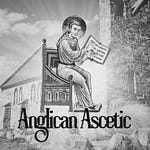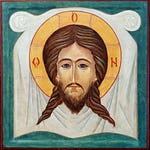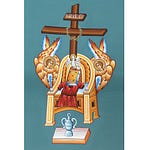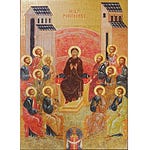Homily offered by Father Matthew C. Dallman, Obl.S.B., for the Parish of Tazewell County on the Sunday after the Ascension, 2021.
We are taught today by Saint John the Evangelist (also known Saint John the Theologian) that God hath given us eternal life. And, he adds, this life is in His Son. This is to what Saint Paul is referring when he spoke of seeing God face to face. This is also what was described in the three synoptic Gospel accounts (Matthew, Mark, Luke) in the Transfiguration of Jesus: the three disciples on the mountain with Jesus saw Him transfigured, which is a heavenly vision of His true reality and identity (both fully man, and fully God; or put another way, completely within our conditions of time and space, and at the same time completely beyond and outside time and space conditions).
Jesus in Saint John’s gospel account so often spoke of Himself using the phrase “I am”—I am the vine; I am the good shepherd; I am way, the truth and the life; I am the bread of life, and so on; in Scripture God also is recorded to have spoken this way, such as when Moses learned that God’s name is “I am whom I am.” The gift of eternal life through Christ, the goal of which is to behold God face to face, transfigured along with Him, our own being within God’s transfigured self: the vision of God is a participation in His I Am-ness, a participation that begins really and actually in this life through the Sacraments liturgically celebrated, and continues into the next, whereby we are invited to continually grow in God’s love and service. Each eucharist we celebrate is like another rung up the ladder to our goal, the divine reality in community with the triune God. Each Eucharist we receive allows us to become what we receive more and more, that we say with Saint Paul, “I am crucified with Christ, nevertheless I live.” “Yet,” he adds, “not I, but Christ liveth in me.”
This is the mystery that the Upper Room church of 120 souls began to live into as they prayed with one accord in the sacred space Jesus appointed them to after His glorious Ascension. We are told that they prayed together with one accord—meaning, with one heart, with one central purpose, with one liturgy—and we are told that they were full of joy, indeed full of grace, for they had all taken on the heart of Mary, and begun to make her heart their heart, her heart becoming the heart of the Church: for Our Lady, Blessed Mary was with the Church in the Upper Room. And as the other 119 began to share together with Mary in the joyful recognition that Jesus is their light, Jesus is their salvation, and that the I Am-ness of Jesus is with them in the Upper Room, with them wherever two or three are gathered, with them in their heart whenever they call upon His most holy Name for mercy, with them in Holy Communion, with them through Scripture and the preaching of their brother and sister apostles (preeminently in the preaching of the Twelve)—as they began to share together in the joyful knowledge that Jesus is the Way, is the Truth, is the Life, every word of Mary (the bearer of God, or in Greek: the Theotokos) that she shared about her Son, especially the profoundly mysterious moments early in the life (the Annunciation, her Visitation with Elizabeth, the Nativity, the Presentation, and the losing and then finding of Jesus in Temple) had transfiguring power—Christ speaking through Mary—because the disciples in the Upper Room had experienced His blessed Passion and precious Death, His mighty Resurrection and glorious Ascension. The key for them to eternal life is the key for us: having in daily remembrance of the Paschal Mystery of Christ, and ordering our lives—ordering our every day—around Jesus and His most holy Name, for this is how the Church renders unto Jesus most hearty thanks for the innumerably benefits procured unto us by Him.
This unfathomable recognition, indeed the true Mystery of Christ, is summarized by Our Lord’s words in our Gospel account today: “For their sakes I sanctify myself, that they also might be sanctified through the truth.” For us, Christ showed Himself holy, that we might become holy through Him. All of what He revealed to the world during his three or four decades of human life was, and is, for our sakes—that we might be transformed, our hearts illumined and on fire, with true knowledge of Christ’s presence everywhere and in all places that, as Saint Paul taught the Church in Thessalonica, we may rejoice evermore, pray without ceasing, and in every thing give thanks: for this is the will of God in Christ Jesus concerning us.










Share this post